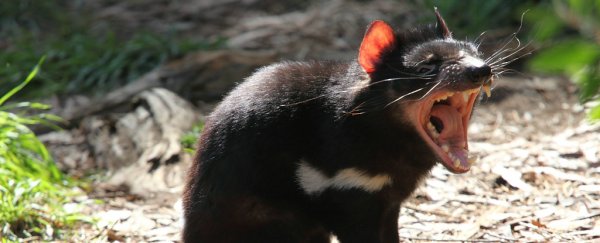It's no secret that the news has been pretty grim for the environment of late, and Australia in particular has had a bad run.
Not only has 93 percent of the Great Barrier Reef now officially been damaged by bleaching, one of the country's most enigmatic animals, the Tasmanian devil, has been steadily wiped out over the past 20 years by a parasitic facial cancer, leaving less than 30 percent of the species remaining.
But researchers have just reported the discovery of several antibodies that seem to fight off the disease, providing some hope that we might finally have a way to save our favourite carnivorous marsupials.
The Tasmanian facial devil tumour disease has been plaguing Tassie devils for two decades now, and scientists still have very little idea where it came from and how it works (for those of you who want to know here's what it looks like. Warning: not pretty).
Researchers have been desperately trying to develop preventions and treatments against the disease, but despite some promising progress towards a vaccine, for the most part, study after study has come back with nothing but bad news.
"The scientific community trying to address the disease hoped it was slowing down or would show signs of slowing down but this research proves it is not doing that and is more likely to get stronger," said Kathy Belov from the University of Sydney back in 2012, when her team found out that the disease was "immortal".
But now scientists have finally, finally released some good news for the little carnivorous marsupials - they've managed to identify a naturally occurring antibody that seems to offer some animals protection against the tumour disease.
It's still very, very early days, but based on similar treatments being trialled in humans, the researchers suggest they might be able to use the antibody to develop long-lasting prevention against the disease.
"This process known as 'active immunotherapy', is becoming more and more accepted in treating human cancers, and we think it could be the magic bullet in saving the Tasmanian devils from extinction," said lead researcher Beata Ujvari, from Deakin University in Australia.
"Anti-tumour vaccines that enhance the production of these natural antibodies, or direct treatment of the cancer with natural antibodies, could become a solution to help halt this disease."
If immunotherapy sounds familiar, that's because pumping up the immune system to fight disease is taking off at the moment. Sean Parker of Napster fame just invested US$250 million into immunotherapy treatments against cancer, and, in early trials, 94 percent of advanced leukaemia patients went into remission after being treated with their own T-cells.
Scientists have also managed to protect monkeys from HIV for up to six months with a single injection of antibodies.
The hope is that a similar technique might work in Tasmanian devils to lower the risk of facial tumour disease, which is thought to be spread via fighting. Within a year and a half of being infected, animals die either through organ failure, infection, or malnutrition because the facial tumours make it so hard to eat.
To figure out how to stop this, the Deakin team scanned the blood of 23 Tasmanian devils, nine of which had the tumour disease, and 14 that were healthy.
Their results identified several antibodies that were higher in those without the disease.
"We found that devils that have a higher ratio of these natural antibodies were less likely to have cancer," said Ujvari. "We can deduce then that devils with higher natural antibody ratio are therefore less susceptible to the contagious cancer."
The results have been published in Scientific Reports, and the team will now continue to figure out how these antibodies could be used to fight the parasitic cancer. They're also encouraging other groups to do the same.
Like we said before, it's very, very early days. We don't even have a potential treatment to trial just yet, so we can't get too excited.
But this is one of the few times scientists have found something that they think might be able to slow down the spread of this devastating disease, and it's looking like our best bet right now.
Let's just hope we can do something with this information while there are still enough Tasmanian devils left to save this adorable and ecologically important species from extinction.
